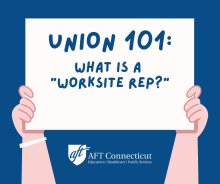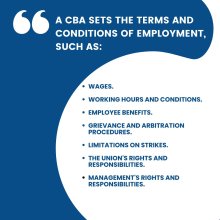‘Right-to-Work’ and ‘At-Will Employment’

The Taft-Hartley Act of 1947 allows states to pass “right-to-work” laws, which bar mutual agreements between labor and management to require employees to join a union as a condition of employment. Labor advocates often refer to this as “right to work for less,” because these states are not as conducive to organizing and union density, which tends to give employers an advantage over workers, and unions help workers earn more.
Fortunately, Connecticut is not a “right-to-work” state — though we are never more than one election away from that changing.
What Connecticut is, is an “at-will employment” state, which means workers who are not in a union can be fired for any reason (other than an illegal reason, such as discrimination).

‘Worksite Rep’
‘Worksite rep’ is a general term used to describe volunteer members who take on more of an activist or leadership role. Generally this includes stewards and union representatives, which in some bargaining units are interchangeable terms, but in our union are two distinct roles:
- Stewards defend our contract by serving as delegates for members and representing them during investigative meetings and grievances. They have specialty training and experience with our contract.
- Union representatives serve as conduits of information between their work areas and UHP leadership.
‘Free Rider’
A “free rider” is a term used for an employee in a bargaining unit job who benefits from the contract without contributing to support the union by paying dues.
Union Shop
A union shop is a private-sector term used for when employees are required to join the union representing their job classification. Union shops help ensure strong contract enforcement and collective bargaining power.
Grievance
A grievance is a dispute between union member and management handled through procedure outlined in the contract. This usually is unique to each union's collective bargaining agreement.
CBA Expiration
A collective bargaining agreement expiration is the date when a contract's provisions end. If a new CBA is not in place by this date, the union can extend the old contract while bargaining continues, work without a contract, or strike (rare, only as a last resort, and illegal for CT state employees).

CBA
The collective bargaining agreement represents one of most significant benefits of uniting with coworkers for strength on job. Management promises are temporary; union contracts are in writing.
Bargaining in Good Faith
This is the legal principal that compels employers to negotiate when they don't want to. Employers are not supposed to make certain changes without bargaining with the union or bypass the union and deal directly with employees.
Collective Bargaining
One of the most fundamental benefits of choosing to unite with colleagues to harness the power of a collective voice in the workplace: Working people, through their unions, negotiate contracts with their employers to determine their terms of employment.
Your Rights at Work
The National Labor Relations Act (NLRA), Section 7, guarantees employees certain rights, including the right to self-organize, discuss organizing efforts, sign petitions/cards without fear of retaliation, and distribute literature.
Arbitration
Arbitration is a means for settling labor disputes through a neutral and independent third party instead of relying on the court system or job actions, such as strikes or lock-outs
Weingarten Rights
Did you know, union members don’t have to be alone when questioned by their employer? A 1975 SCOTUS decision established Weingarten Rights.
Loudermill Rights
How members can assure Loudermill Rights are upheld when facing allegations by employer; vital due process protections for public employees.
Garrity Rights
Do you know your Garrity Rights? A 1966 U.S. Supreme Court ruling protects public employees from incriminating themselves during investigatory interviews with employers.
Check back for additional #Union101 facts!
